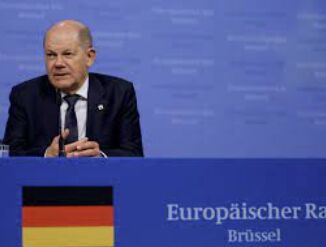German Chancellor Olaf Scholz Defies International Pressure, Rejects Immediate Ceasefire in Gaza Strip
German Chancellor Olaf Scholz opposes an immediate ceasefire in Gaza, believing it would allow Hamas to recover. His stance contradicts calls from Arab countries, France, and Turkey for an end to the conflict. The ongoing violence has caused significant loss of life and worsened the humanitarian crisis in the region. Scholz's position raises questions and adds complexity to the conflict, while the international community seeks a resolution for peace and stability.
German Chancellor Olaf Scholz has voiced his opposition to an immediate ceasefire in the Gaza Strip, amidst growing international pressure to end the conflict. Scholz's stance contrasts with the calls made by various Arab countries, French President Emmanuel Macron, and Turkish President Recep Tayyip Erdogan, who is set to meet with the German leader next week.
During a debate organized by the German regional daily Heilbronner Stimme, Scholz argued that an immediate ceasefire or a long pause would enable Hamas to recover and acquire new missiles. Instead, he called for "humanitarian pauses" to address the escalating crisis in the region. The conflict was triggered by Hamas's unprecedented attack on Israel, leading to extensive airstrikes by Israel and a subsequent ground operation to dismantle the Islamist militant group. The ongoing violence has resulted in a significant loss of life and the exacerbation of the already dire humanitarian situation in the densely populated Palestinian territory.
According to the latest official Israeli figures, the Hamas attack on October 7 claimed approximately 1,200 lives, predominantly civilians. Since the Israeli military began their ground operations, 42 soldiers have been killed in the Gaza Strip. Additionally, the Israeli military estimates that around 240 people were taken hostage during the initial Hamas attack, including at least 30 children, as reported by Israeli media.
The Gaza Strip has suffered devastating consequences as a result of the Israeli military campaign, with over 11,000 people dead, mostly civilians, according to the Hamas-run health ministry. Chancellor Scholz's position is raising questions among world leaders and further contributing to the complexity of the conflict. As the international community continues to grapple with finding a resolution, the urgent need for peace and stability in the region remains at the forefront of diplomatic efforts.




